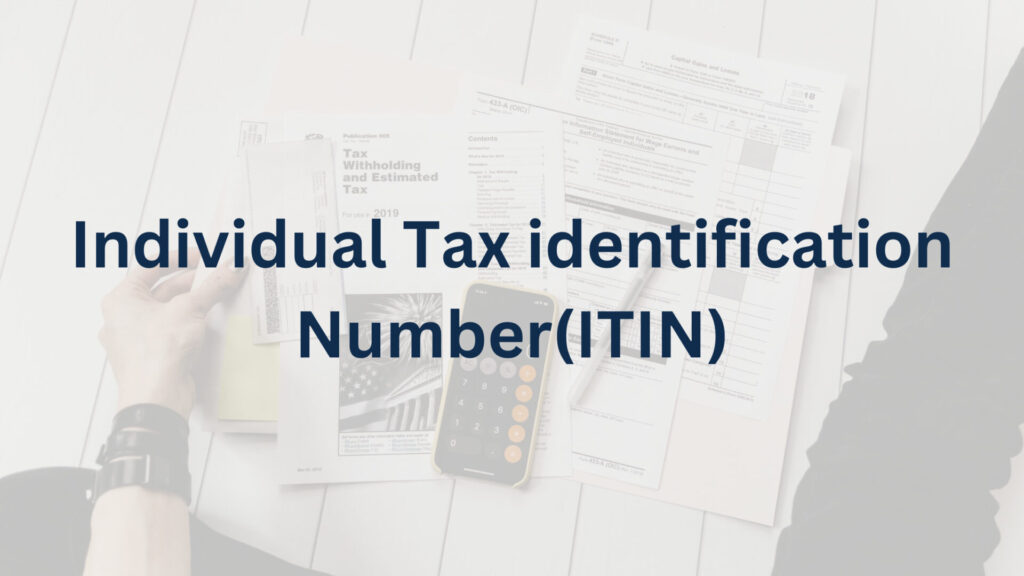Individual Tax Identification Number(ITIN) from IRS USA

Individual Tax Identification Number (ITIN) is a unique nine-digit tax processing number issued by the Internal Revenue Service (IRS) for individuals who are not eligible for a Social Security Number (SSN) but are required to file tax returns with the IRS. In this article, we will discuss everything you need to know about the ITIN, including its purpose, eligibility requirements, application process, and benefits.
Introduction
Individual Tax Identification Number (ITIN) is a tax processing number issued by the IRS to individuals who are not eligible for a Social Security Number (SSN). ITIN is used for tax purposes only and cannot be used for any other purpose, such as obtaining a driver’s license or opening a bank account. If you are required to file a tax return with the IRS and do not have an SSN, you may apply for an ITIN.
Purpose of ITIN
The purpose of the ITIN is to provide a tax processing number to individuals who are not eligible for an SSN. The ITIN allows these individuals to file tax returns with the IRS and pay taxes on their income. The ITIN also enables the IRS to identify and process tax returns efficiently and accurately.
Eligibility for ITIN
To be eligible for an ITIN, you must be a non-resident alien, spouse or dependent of a U.S. citizen or resident alien, non-resident student, researcher, or professor, foreign investor, non-resident foreign national, resident alien, or other eligible individual who is required to file a tax return with the IRS.
Non-Resident Aliens
Non-resident aliens who receive income from sources within the United States and are required to file a tax return with the IRS are eligible for an ITIN.
Spouses and Dependents of U.S. Citizens/Resident Aliens
Spouses and dependents of U.S. citizens or resident aliens who are not eligible for an SSN are eligible for an ITIN if they are required to file a tax return with the IRS.
Non-Resident Students, Researchers, and Professors
Non-resident students, researchers, and professors who receive taxable income from sources within the United States and are required to file a tax return with the IRS are eligible for an ITIN.
Foreign Investors
Foreign investors who receive taxable income from sources within the United States and are required to file a tax return with the IRS are eligible for an ITIN.
Non-Resident Foreign Nationals
Non-Resident Foreign Nationals
Non-resident foreign nationals who receive taxable income from sources within the United States and are required to file a tax return with the IRS are eligible for an ITIN.
Resident Aliens
Resident aliens who are not eligible for an SSN but are required to file a tax return with the IRS are eligible for an ITIN.
Other Eligible Individuals
Other eligible individuals who are not eligible for an SSN but are required to file a tax return with the IRS are also eligible for an ITIN.
How to Apply for ITIN
To apply for an ITIN, you must complete a W-7 form and submit it to the IRS along with supporting documents that prove your identity and foreign status. The W-7 form is available on the IRS website or at IRS Taxpayer Assistance Centers.
W-7 Form
The W-7 form requires you to provide your personal information, including your name, mailing address, date of birth, and foreign status. You must also provide the reason for applying for an ITIN, such as filing a tax return, receiving a refund, or claiming an exemption.
Supporting Documents
To prove your identity and foreign status, you must submit original or certified copies of documents such as passports, driver’s licenses, birth certificates, and school records. The IRS maintains a list of acceptable documents on its website.
ITIN Renewal and Expiration
ITINs expire after a certain period and must be renewed if you need to file a tax return with the IRS. ITINs issued before 2013 with middle digits 78 or 79 also need to be renewed. To renew an ITIN, you must submit a new W-7 form and supporting documents to the IRS.
Benefits of ITIN
The main benefit of ITIN is that it allows you to file a tax return with the IRS and pay taxes on your income, even if you are not eligible for an SSN. It also enables the IRS to process your tax return efficiently and accurately.
Frequently Asked Questions
What is the difference between ITIN and SSN?
The main difference between ITIN and SSN is that ITIN is used for tax purposes only, while SSN is used for various purposes, such as obtaining a driver’s license or opening a bank account.
How long does it take to get an ITIN?
It may take up to 11 weeks to get an ITIN, depending on the volume of applications the IRS receives.
Can I apply for ITIN online?
No, you cannot apply for ITIN online. You must submit a W-7 form and supporting documents to the IRS by mail or in person.
Can I use ITIN to work in the U.S.?
No, ITIN cannot be used to work in the U.S. ITIN is used for tax purposes only.
Can I apply for an ITIN for my newborn child?
Yes, you can apply for an ITIN for your newborn child if you need to include the child on your tax return.
Conclusion
In conclusion, an ITIN is a tax processing number issued by the IRS for individuals who are not eligible for an SSN but are required to file a tax return with the IRS. To apply for an ITIN, you must complete a W-7 form and submit it to the IRS along with supporting documents that prove your identity and foreign status. ITINs expire after a certain period and must be renewed if you need to file a tax return with the IRS. The main benefit of ITIN is that it allows you to file a tax return with the IRS and pay taxes on your income, even if you are not eligible for an SSN.
